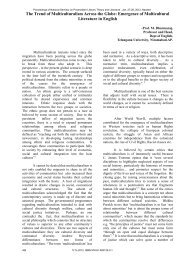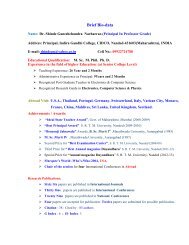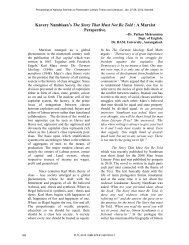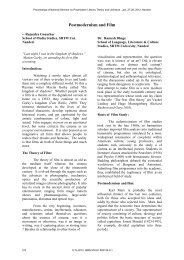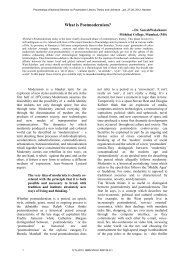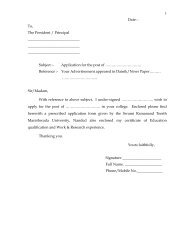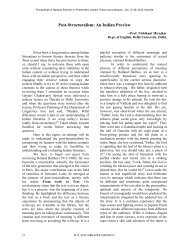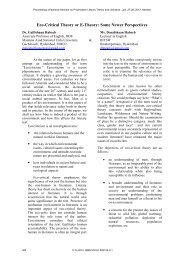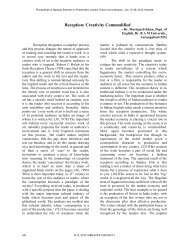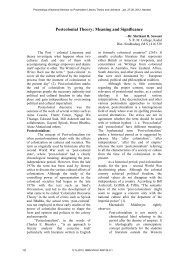Postcolonial Feminist Theory: An Overview - Igcollege.org
Postcolonial Feminist Theory: An Overview - Igcollege.org
Postcolonial Feminist Theory: An Overview - Igcollege.org
Create successful ePaper yourself
Turn your PDF publications into a flip-book with our unique Google optimized e-Paper software.
Proceedings of National Seminar on Postmodern Literary <strong>Theory</strong> and Literature , Jan. 27-28, 2012, Nandedalthough he knows she isn’t wholly content withher uneventful existence, “chaos is the oppositepole of boredom” [HV–11], Marianne – likeother Carter heroines – opts for chaos. As wehave already observed, in the process, shebecomes the willing hostage of the Barbarianyouth Jewel, and, later, his wife.She also, inevitably, learns what liesbeneath the Barbarian façade, and so beginswhat Lorna Sage describes as “the novel’ssceptical exploration of the whole mystiqueof otherness”. [Sage: 1994, P.18]Carter introduces a discussion of genderrelationships which becomes explicit, highlycomplicated, akin to the kinds of issues that havepreoccupied her first novel onwards, where theparticipation of women like Ghislaine in theprocess of their own, extreme, victimization is aproblematic aspect of the text. Though Cartercreates a similar kind of situation, the differentperspectives of the participants makes aprofound difference. Explaining the bareaspects of the story, as Paulina Palmer says, itseems quite clear who is victim, who aggressor:Jewel’s treatment of her [Marianne]quickly lapses into physical violence.Having persuaded her to steal a lorry anddrive him to freedom, he hits her to makeher drive faster subsequently, he introducesher into the tribe to which he belongs.When she tries to escape, he follows her toher hiding place in the forest, and rapesher.[Palmer: 1987, P.188]But Paulina as Palmer argues, althoughCarter thus “runs the risk of tainting her fictionwith the attitude associated with popular genreswhich exploit the topic of sex and violence forthe purpose of titillation”, it is a problem she“succeeds in surmounting”.[Palmer: 1987,P.188] Palmer justifies her statement byfocusing on Carter’s liberal humanistictendencies, claiming that not only does sheendow Marianne with a resourceful and defiantpersonality, but also invites compassion forJewel who, “trapped in codes of aggression andcompetition”,[Palmer: 1987, P. 188] isdetermined to dominate Marianne basically outof fear. Thus, just as Carter succeeds increditing her female protagonists with a strongdegree of autonomy, so too she manages tomake her male protagonists convincingly drawnhuman beings, without in any way condoningthe acts of violence they commit. Herrepresentation of them, trapped in codes ofaggression and competition, comes remarkablyclose to the memorable definition of masculinitycoined by Frankie Rickford who suggests that:Masculinity may be a state of frozen terror andthe urgency of men’s sexual desire, adesperation to bury themselves in a warm bodyto escape from it for a few seconds.[Rickford:1983, P. 142]All through the novel, it is observed thatJewel’s acts of violence are basically due to hisinnate desire to dominate Marianne, and he isovercome by the fear factor also. The veryreason he gives for the rape of Marianne is thathe is “very frightened” of her [HV–56]. He isalso surprised at the discovery that she does not“sprout sharp teeth in her private parts” [HV–49,59] a piece of propaganda promulgated bythe tribe to which he belongs. He isoverwhelmed by any sign of her vulnerabilityand even interprets it as a proof of his capacityto subjugate her completely. Further histriumphant remark, “I’ve nailed you onnecessity, you poor bitch”, [HV–56], when hisheinous act of rape forces her into marriage withhim, pinpoints the urgency of the power strugglein which he feels himself to be engaged. Thevery tattoo of Eve tempting Adam with aperfidious smile on his back, has the power toplace this struggle in the context of misogynisticculture. It succeeds in lifting it from the lesserpersonal place to a political and ideological one.<strong>An</strong> important point raised by Carter’streatment of the interrelation between sex andviolence in her fiction is, the possibility ofdistinguishing the text that gives a seriousthought to the issue and the one that is a mereexercise of pornography. This is furtheramplified, as critics observe by the ambiguity ofthe visual image or a textual episode. Thus thereis always the possibility of one reader,interpreting as a serious investigation, into thefemale victim’s response to the experience ofviolent sex, while another regarding it aspornographic. But Carter’s austerely functionalstyle of writing in Heroes and Villains leaves noroom for ambiguity. Overall, she appears to becondemnatory of male sexual violence. There isabsolutely no voyeuristic pleasure to be gained303 PLTL-2012: ISBN 978-81-920120-0-1



